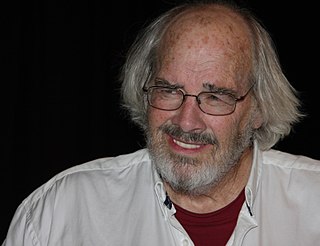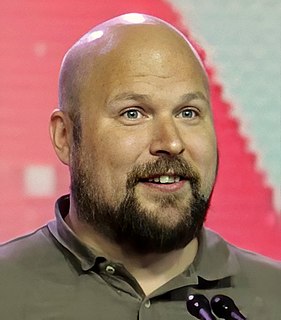A Quote by Orson Scott Card
God, our genes, our environment, or some stupid programmer keying in code at an ancient terminal - there's no way free will can ever exist if we as individuals are the result of some external cause.
Related Quotes
Isn't it true that whatever isn't determined by our genes must be determined by our environment? What else is there? There's Nature and there's Nurture. Is there also some X, some further contributor to what we are? There's Chance. Luck. This extra ingredient is important but doesn't have to come from the quantum bowels of our atoms or from some distant star. It is all around us in the causeless coin-flipping of our noisy world, automatically filling in the gaps of specification left unfixed by our genes, and unfixed by salient causes in our environment.
Yes, genes are important for understanding our behavior. Incredibly important - after all, they code for every protein pertinent to brain function, endocrinology, etc., etc. But the regulation of genes is often more interesting than the genes themselves, and it's the environment that regulates genes.
The great paradox of determinism and free will, which has held the attention of the wisest of philosophers and psychologists for generations, can be phrased in more biological terms as follows: If our genes are inherited, and our environment is a train of physical events set in motion before we were born, how can there be a truly independent agent within the brain? The agent itself is created by the interaction of the genes and the environment. It would appear that our freedom is only a self delusion.
Of course our genes will make some capacities very much easier to learn than others, and of course our genes themselves are not learned. But the point remains that genes themselves are not cognitive capacities, and that anything worth calling a cognitive capacity will depend to some degree on learning and so not be innate.
God does not cause our misfortunes. Some are caused by bad luck, some are caused by bad people, and some are simply an inevitable consequence of our being human and being mortal. living in a world of inflexible natural laws. The painful things that happen to us are not punishments for our misbehavior, nor are they in any way part of some grand design on God's part. Because the tragedy is not God's will, we need not feel hurt or betrayed by God when tragedy strikes. We can turn to Him for help in overcoming it, precisely because we can tell ourselves that God is as outraged by it as we are.
Epigenetics doesn't change the genetic code, it changes how that's read. Perfectly normal genes can result in cancer or death. Vice-versa, in the right environment, mutant genes won't be expressed. Genes are equivalent to blueprints; epigenetics is the contractor. They change the assembly, the structure.
Schwartz's research suggests something important: we can stretch our personalities, but only up to a point. Our inborn temperaments influence us, regardless of the lives we lead. A sizeable part of who we are is ordained by our genes, by our brains, by our nervous systems. And yet the elasticity that Schwartz found in some of the high-reactive teens also suggests the converse: we have free will and can use it to shape our personalities.
The study of how substances alter gene expression is part of the field of epigenetics. Some chemical exposures appear to turn on and turn off genes in ways that disregulate cell growth and predispose for cancer. From this perspective, our genes are less the command-and-control masters of our cells and more like the keys of piano, with the environment as the hands of the pianist.
Every age manifests itself by some external evidence. In a period such as ours when only a comparatively few individuals seem to be given to religion, some form other than the Gothic cathedral must be found. Industry concerns the greatest numbers-it may be true, as has been said, that our factories are our substitute for religious expression.
Stupid religion makes stupid beliefs, stupid leaders make stupid rules, stupid environment makes stupid health, stupid companions makes stupid behaviour, stupid movies makes stupid acts, stupid food makes stupid skin, stupid bed makes stupid sleep, stupid ideas makes stupid decisions, stupid clothes makes stupid appearance. Lets get rid of stupidity from our stupid short lives.
Some of our struggles involve making decisions, while others are a result of the decisions we have made. Some of our struggles result from choices others make that affect our lives. We cannot always control everything that happens to us in this life, but we can control how we respond. Many struggles come as problems and pressures that sometimes cause pain. Others come as temptations, trials, and tribulations.
There's this very interesting and complicated connection between our environment and our genes and the traits that come out of the environment plus genes. And there's huge potential. I mean we see amazing abilities. Marie Curie, Albert Einstein. All sorts of arts, and literature and so forth. These are not typical traits of everybody on earth.






































